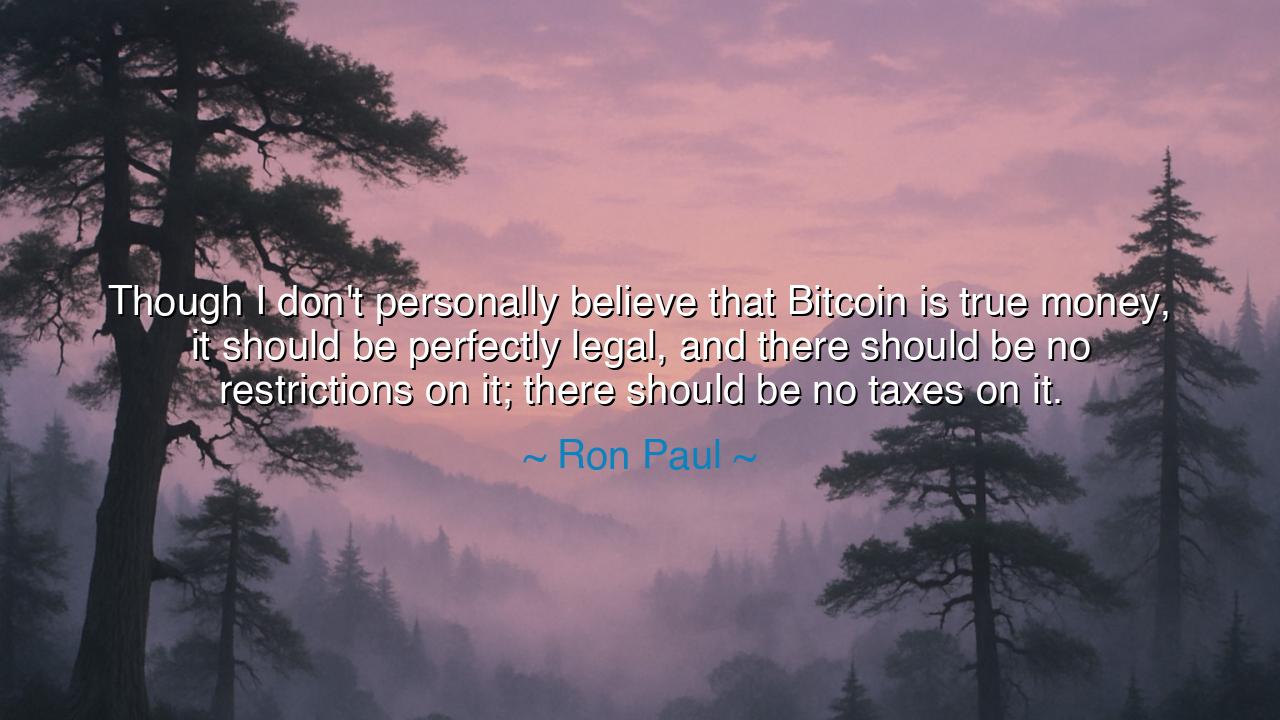
Though I don't personally believe that Bitcoin is true money, it
Though I don't personally believe that Bitcoin is true money, it should be perfectly legal, and there should be no restrictions on it; there should be no taxes on it.






The words of Ron Paul, a man long known as a champion of liberty and critic of centralized power, strike with the tone of both skepticism and freedom: “Though I don't personally believe that Bitcoin is true money, it should be perfectly legal, and there should be no restrictions on it; there should be no taxes on it.” Here, he draws a boundary between his personal belief and the principle of liberty. He does not see Bitcoin as the same as gold or traditional money, yet he insists it must be allowed to flourish, unchained by the heavy hand of government. His message is clear: the freedom to choose—even in matters of money—is more sacred than conformity to any one definition.
The origin of this declaration lies in Paul’s lifelong defense of sound money and resistance to state overreach. To him, true money has always been gold or silver—tangible stores of value beyond the manipulation of printing presses. But in speaking of Bitcoin, he reveals that while he does not anoint it with the crown of “true money,” he still demands it be free. This reveals the heart of his philosophy: the role of government is not to dictate or suppress, but to allow the marketplace of ideas and inventions to flourish without coercion.
History gives weight to his warning. Recall the story of paper money in colonial America. In some colonies, governments inflated currency until it was worthless, destroying the savings of the people. The lesson of those days, and of many times since, is that when governments control money with unchecked power, corruption and ruin often follow. Paul’s call for freedom in Bitcoin echoes this truth: better to allow innovation and experimentation in the open, even with risks, than to let central authority crush it beneath rules and taxes before it can prove its worth.
We see also a reflection of ancient struggles. In Athens and Rome, the debasement of currency—when rulers mixed base metals into coins—undermined trust in the economy and hastened decline. Citizens who once relied on the integrity of their money were betrayed by those in power. Ron Paul, mindful of such history, declares that people must be free to seek alternatives, to place their trust in something outside the manipulation of kings and states. Bitcoin, whether or not it is true money, represents that yearning for independence.
His words also highlight a paradox: one need not personally believe in something to defend its freedom. Paul shows that liberty is not the defense of what one agrees with, but the defense of the right of others to choose their own path. This is the deeper meaning of his statement: even if Bitcoin is not the gold of old, it must still be free to rise or fall by its own merit, not strangled by the restrictions of power.
The lesson for us is profound. We must learn to guard freedom of choice in every realm—commerce, ideas, and innovations alike. When new inventions emerge, do not rush to crush them with taxes or bans, for in doing so, society may strangle its own progress. Instead, let them grow, let them be tested in the fires of reality, and let the people decide their worth. For freedom is the soil from which both truth and prosperity spring.
Therefore, children of tomorrow, remember Ron Paul’s teaching: even if you doubt, defend the right of others to try. Do not cling only to what you know; allow room for what is new. Let the spirit of liberty guide your judgments, not fear or control. For the strength of a free society is not that all believe the same, but that all are free to believe, to test, to build—and from that freedom, the truest wealth, whether of coin or conscience, shall emerge.






AAdministratorAdministrator
Welcome, honored guests. Please leave a comment, we will respond soon